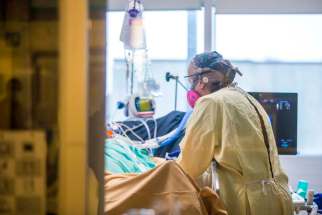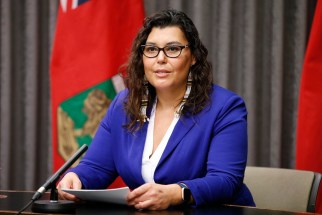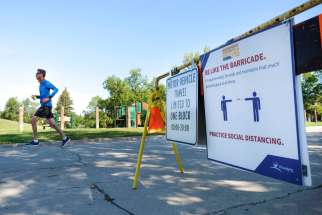Lockdowns raise other health risks, U.S. witness tells hearing on Manitoba pandemic restrictions
Read this article for free:
or
Already have an account? Log in here »
To continue reading, please subscribe:
Monthly Digital Subscription
$0 for the first 4 weeks*
- Enjoy unlimited reading on winnipegfreepress.com
- Read the E-Edition, our digital replica newspaper
- Access News Break, our award-winning app
- Play interactive puzzles
*No charge for 4 weeks then price increases to the regular rate of $19.00 plus GST every four weeks. Offer available to new and qualified returning subscribers only. Cancel any time.
Monthly Digital Subscription
$4.75/week*
- Enjoy unlimited reading on winnipegfreepress.com
- Read the E-Edition, our digital replica newspaper
- Access News Break, our award-winning app
- Play interactive puzzles
*Billed as $19 plus GST every four weeks. Cancel any time.
To continue reading, please subscribe:
Add Free Press access to your Brandon Sun subscription for only an additional
$1 for the first 4 weeks*
*Your next subscription payment will increase by $1.00 and you will be charged $16.99 plus GST for four weeks. After four weeks, your payment will increase to $23.99 plus GST every four weeks.
Read unlimited articles for free today:
or
Already have an account? Log in here »
Hey there, time traveller!
This article was published 04/05/2021 (1683 days ago), so information in it may no longer be current.
Pandemic lockdowns are leading to increased health risks for patients who either choose or are forced to delay medical treatments, higher incidents of drug overdoses, and a growing mental health crisis, a U.S. medical expert told a Winnipeg court Tuesday.
“Lockdowns are… an extraordinary measure,” Jay Bhattacharya said via video link from California.

Bhattacharya is a Stanford University medical school professor and a critic of lockdown measures. He is one of three university epidemiologists behind the “Great Barrington Declaration,” which endorses “focused protection” of those most vulnerable to COVID-19 over pandemic restrictions that impact everyone.
“The normal response to an extraordinary measure means increased anxiety, increased alcoholism, increased opioid use, increases in all kinds of things depending on who you are,” Bhattacharya said.
“Some are more susceptible than others. I think we agree that it is adding stress on Canadians and Americans and anywhere lockdowns are in place.”
Bhattacharya is a witness on side with seven churches and three individual Manitobans who have taken the province to court over pandemic restrictions limiting their rights to assembly and worship together.
The group is being represented in court by the Justice Centre for Constitutional Freedoms, a Calgary-based advocacy group which has launched similar court challenges in B.C. and Alberta.
Tuesday marked the second day of the hearing at the law courts in Winnipeg.
Lockdown measures in Manitoba and other jurisdictions have included the suspension of elective and other medical procedures to keep hospital resources open for COVID-19 patients, Bhattacharya wrote in a report provided to court.
“The normal response to an extraordinary measure means increased anxiety, increased alcoholism, increased opioid use, increases in all kinds of things depending on who you are.”– Jay Bhattacharya
“Naturally, patients who skip medical services will suffer adverse health consequences,” he wrote. “The empirical evidence supporting this includes documentation for plummeting child vaccination rates, worse cardiovascular disease outcomes, less cancer screening, and deteriorating mental health.”
Under cross examination by Manitoba government lawyer Heather Leonoff, Bhattacharya said many patients are postponing addressing serious medical issues or procedures, including vaccinations for their children, fearing visiting a hospital or clinic might expose them to the novel coronavirus.
“Sometimes, and this was especially so early (in the COVID-19 pandemic), people were afraid to go to the hospital or go to the clinic at all,” he said.
“Right, and that’s not caused by the government’s policy, that’s just a lot of people being afraid,” Leonoff replied.
“Well, the government sets the tone for the policy,” Bhattacharya said. “If the government sets the tone for panic, then the people will traditionally not bring their children in to be vaccinated.
“People are not getting routine checkups because they are scared to go to the doctor,” he said. “It also happens because of public announcements that hospitals are being overrun and so people stay home, even with very severe illness… The net effect is to have many people with care that should have happened, not happen.”
“Sometimes, and this was especially so early (in the COVID-19 pandemic), people were afraid to go to the hospital or go to the clinic at all.”– Jay Bhattacharya
Leonoff disputed Bhattacharya’s contention lockdown measures are contributing to a rise in the number of people suffering mental health issues, and pointed to a report by the Centre for Addiction and Mental Health that says Canada was already experiencing a mental health crisis before the pandemic was declared.
“The anxiety caused by the COVID response of the lockdowns has affected basically everyone, and some people are coping and some people are not,” Bhattacharya responded.
“For instance, in the U.S., opioid use is up, very sharply up, and alcohol in the U.S. and Canada is sharply up. Coping healthily and coping unhealthily are two different things.”
Bhattacharya said modelling studies showing the seeming effectiveness of lockdown measures in tamping down the spread of the virus are likely more indicative of a delay in reaching a peak infection rate.
“The real issue is what the impact is on the number of cases,” he said.
dean.pritchard@freepress.mb.ca

Someone once said a journalist is just a reporter in a good suit. Dean Pritchard doesn’t own a good suit. But he knows a good lawsuit.
Our newsroom depends on a growing audience of readers to power our journalism. If you are not a paid reader, please consider becoming a subscriber.
Our newsroom depends on its audience of readers to power our journalism. Thank you for your support.
History
Updated on Thursday, May 6, 2021 10:18 AM CDT: Corrects typo







